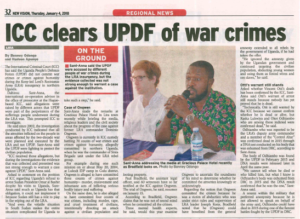As the trial of Dominic Ongwen continues at the International Criminal Court (ICC), civil society practitioners and community members in Uganda were left infuriated by a newspaper article purporting that the ICC had cleared the Uganda People’s Defense Forces (UPDF) of war crimes in northern Uganda. The article appeared in the New Vision newspaper on January 4, 2018, titled: “ICC Clears UPDF of War Crimes,” and immediately resulted in strong reactions on Facebook and questions on Twitter, as well as on other social media platforms. As it turned out, however, the headline and portions of the accompanying article were taken out of context.
The authors of the article based their headline on remarks by Dahirou Sant-Anna, the international cooperation adivisor in the Office of the Prosecutor at the ICC, as he responded to a question regarding alleged war crimes by the UPDF in northern Uganda. Sant-Anna was was quoted by the newspaper as saying, “The ICC received those allegations, but during the investigations the evidence that was collected and presented was not strong enough to warrant a case against the UPDF.” Sant-Anna was addressing journalists and civil society organizations in Lira district during a break in the trial Ongwen’s trial.
Ongwen’s trial has undoubtedly resurrected discussions on accountability by the UPDF in northern Uganda. It is therefore likely that the newspapar authors misinterpreted Sant-Anna’s comments as an exonoration of the UPDF, thereby resulting in the news headline and angry reactions from members of the public. In response, the ICC contacted the New Vision newspaper, and a clarification was subsequently published on January 12, clarifying the statements made by the ICC’s representative.
Ongwen has been on trial since December 6, 2016. He is charged with with 70 counts of war crimes and crimes against humanity allegedly committed in the former Internally Displaced Persons (IDP) camps of Lukodi, Abok, Pajule, and Odek. To date, 61 witnesses have testified for the prosecution.
While the New Vision article was a minor public relations disaster for the ICC, having come at a time when Ongwen’s trial is procceding smoothly, it created a good opportunity for the UPDF leadership in Uganda to conduct public relations. Barely 12 hours after the publication of the article, Major General Muhoozi Kainerugaba, a senior UPDF officer in Uganda tweeted, “The UPDF has always protected the population and fought for the national interest.” Muhoozi’s quote reiterates the UPDF’s stance on war crimes in northern Uganda, with the army leadership always denying culpability.
Prior to this, in October 2017, while testifying at the trial of Ongwen, the Director of Legal Service at the Chieftaincy of Military Intelligence, Lieutenant Colonel Timothy Nabaasa Kanyogonya, denied knowledge of allegations that the UPDF committed atrocities in northern Uganda. “I do not know of any commanders of the UPDF committing atrocities in the war against the LRA,” said Kanyogonya. His testimony also drew strong reactions from community members.
As Ongwen’s trial proceeds, however, the reactions to this newspaper article are a strong indicator that the controversy around war crimes allegedly committed by the UPDF in northern Uganda will not cease, regardless of the trial outcome. Many of these debates were highlighted in a July 2017 International Justice Monitor article detailing how the Ongwen’s trial is influencing discussions on accountability in northern Uganda.
Two witnesses appearing at the ICC have already accused the UPDF of acts of omission, which for some people in northern Uganda could also arguably amount to war crimes. On June 9, 2017, Witness P-280, who also happens to be a survivor of the attack on Abok camp for IDPs, told the ICC that soldiers guarding the camp did not confront LRA fighters as they killed residents, looted, and burned down their homes. The witness told the court that only when LRA fighters shot in the direction of the barracks that the militia engaged in a gunfight with the LRA.
Earlier, on June 2, 2017, Witness P-024, a survivor of a LRA attack on the Lukodi IDP camp, testified before the ICC that government soldiers assigned to protect them fled when rebels attacked the camp.
The UPDF has also been accused of directly committing crimes. In November 2017, a survivor of a LRA attack on the Pajule camp for IDPs in Uganda described to the court how Ugandan government soldiers allegedly tortured him for up to three weeks.
Asked to comment on the newspaper article in lieu of Ongwen’s trial, a community member in Gulu town said, “If this trial was targeting both UPDF soldiers and the LRA rebels, then I would say it is fair because the UPDF soldiers also [allegedly] raped women and killed so many. The UPDF, just like the LRA rebels, [allegedly] tortured people in many places in search for information. UPDF soldiers [allegedly] raped many women and infected them with HIV/AIDS and other sexually transmitted diseases. We also have men who were [allegedly] sodomized by the UPDF soldiers.”
The issue of war crimes in northern Uganda is still a sensitive one and debates on accountability for alleged UPDF crimes will prevail long after Ongwen’s trial is complete. While the ICC may not be in a position to provide solutions in this regard, other options such as the use of domestic courts, may need to be explored for justice in northern Uganda to be considered complete.
Lino Owor Ogora is a peace-building practitioner who has worked with victims of conflict in northern Uganda and South Sudan since 2006. He is also the Co-Founder of the Foundation for Justice and Development Initiatives (FJDI), a local Non-Government Organization based in Gulu District that works with children, youth, women and communities to promote justice, development and economic recovery in northern Uganda.


Hopefully, Dahirou Sant-Anna, the international cooperation adviser in the Office of the Prosecutor at the ICC no longer has this post.